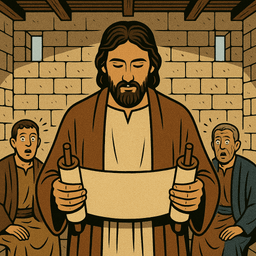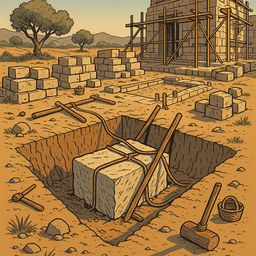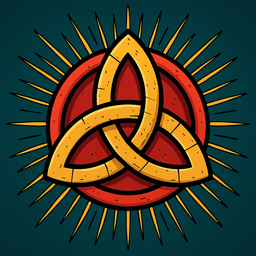
Major Differences with Our Text
Our Bible texts may be quite different to what you’re used to reading!
Here’s a small sample of differences. Some are minor, some are pretty major.
- Prophecies of the Messiah — Restored!
- Better Chronology
- A Clearer Creation
- The Proverbs Early Christians Read
- Fixed Contradictions with David and Goliath
- Who Killed Goliath?
- Foundation Cornerstone
- Kingdom of Heaven?
- Today, You Will Be…
- An Honest John 1:1
- Antichrist or Fake Anointed?
- ‘People’ Not ‘Generation’
- Bad Company?
- The Mystery Sinner
- House-to-House?
- Correctly Translated Texts About Women
- And These Three are One?
- Also: Spurious Texts Grayed-Out

Prophecies of the Messiah — Restored!
The early Christians accused the Pharisees of changing key prophecies of the Messiah to discredit Christianity and Jesus. That may be true in certain places, but it’s also possible that variants and paraphrase versions existed, and the Pharisees preferred the ones that sounded less supportive of Jesus.
Whatever really happened, our translation lets you read the same prophecies of the Messiah that the early Christians read, using the Greek Septuagint.
Some examples:
- In Isaiah 53:5 we find a Messianic prophecy where the Septuagint says, that he ‘carried our sins’, but the Hebrew text now reads, ‘Surely he took up our pain and bore our suffering’.
- In Psalm 40:6, the Septuagint says ‘You prepared a body for me’ - a prophecy quoted in Hebrews 10:5 about Jesus taking human form. Yet the Hebrew text that’s come down to us today has no such words.
- In Isaiah 11:10, the Septuagint says the Messiah will ‘rule the nations’ and ‘the gentiles’ will ‘trust’ in him, but now the Hebrew text merely says that the nations will ‘seek’ him.
These are part of a pattern of differences, specifically targeting Messianic prophecies quoted by the early Christians.

Better Chronology
Did you know that most Bibles use a corrupted chronology in Genesis?
It’s true!
The early Christians argued that the Greek Septuagint was the more accurate version of the Hebrew Scriptures; and we agree, for it even has a more realistic chronology. For example, Adam was created approximately 7,500 years ago, not 6,000 years ago. This longer timeline allows for more reasonable population growth rates in early human history, making stories like Nimrod’s kingdom-building after the Flood possible, for example.
The Septuagint’s dates also align better with archaeological findings. For instance, carbon dating of ruins at Sodom and Gomorrah, and the destruction layers at Jericho, match the Septuagint’s chronology but conflict with the Hebrew-based timeline used by most Bibles. The Septuagint’s dates even correspond better with other ancient historical records, such as Chinese civilization being traced back 5,000 years and the Mayan calendar’s record of a great flood around 3113 BC.

A Clearer Creation
Some people say that the creation account in Genesis 1 contradicts the creation account in Genesis 2.
But this is not the case!
Our older manuscripts read slightly differently, and no contradiction appears. Also, we can see that Genesis 1:1 to Genesis 2:3 is actually a poem, and we have recreated the poetic cadence of the text! Now you can read it how it was meant to be read.

The Proverbs Early Christians Read
Most Bibles contain a version of Proverbs that’s quite different from what the earliest Christians read. How come?
The Christians prefered the Greek Septuagint version, which is, actually our oldest complete version of Proverbs. It lacks many of the corrupted, replaced, and added verses found in later Hebrew manuscripts. For example, in most Hebrew-based Bibles, Proverbs 18:1 says:
Whoever isolates himself seeks his own desire; he breaks out against all sound judgment. —ESV
Is that true? Someone may have good reason to isolate themselves from others (like if someone is being bullied, abused, or manipulated), or someone may be very depressed or suicidal. Why would we say they’re being ‘selfish’ (as the NIV puts it)?
But our translation, from the most ancient manuscripts, reads differently:
Those making excuses are rejected by friends,
And they’ll always be spoken of poorly.
This is universally true, and it makes perfect sense in context.
When you read our translation, you’re likely seeing the same Proverbs the early Christians read. Why settle for a later version when you can read the original?

Fixed Contradictions with David and Goliath
Most Bibles contain a contradictory account of David and Goliath! Did you know that the story appears twice, with different details each time? In most translations, David is both unknown to Saul and already working as his musician, which creates an obvious contradiction.
The answer lies in the ancient manuscripts! The Greek Septuagint (our oldest complete version) is missing large sections of this story - sections that were clearly added later from another source! When these later additions are removed, the story flows perfectly:
- David was already Saul’s musician,
- He volunteered to fight Goliath, and
- He won using his sling!
So we’re are not only removing contradictions, we’re restoring the original story that the ancient peoples read. The added sections include a second introduction of David, a confusing conversation with his brothers, and Saul somehow not recognizing his own musician.
We grey-out these silly added sections, leaving a perfectly logical story.

Who Killed Goliath?
Most Bibles contain a puzzling contradiction in 2 Samuel 21:19, where it says that Elhanan (not David) killed Goliath! Even worse, 1 Chronicles 20:5 says Elhanan actually killed Goliath’s brother. What’s going on here?
The answer lies in a bizarre series of scribal errors! The original Hebrew text got mangled when a scribe accidentally duplicated the word ‘weaver’ from elsewhere in the verse. This started a chain reaction of ‘corrections’ that transformed this:
‘Elhanan killed Lachmi, the brother of Goliath’
Into this:
‘Elhanan from Bethlehem killed Goliath’!
This is a reminder of how careful we need to be with ancient texts. While many modern Bibles try to fix this by inserting ‘[the brother of]’ in brackets, they often leave in other corrupted parts without explanation.
Our translation restores the original reading and explains the comedy of errors behind this silly scribal error.

Foundation Cornerstone
Most Bibles translate Psalm 118:22 as saying Jesus became the ‘chief cornerstone’ or ‘head cornerstone.’ But did you know this creates some logical problems? After all, how can a stone be ‘in charge’ of other stones? And aren’t there usually multiple cornerstones in a building?
The answer lies in the original languages! The Hebrew, Aramaic, and Greek words used here can sometimes mean ‘chief’ – but they often mean ‘source’ or ‘origin.’ In ancient construction, builders would start with one cornerstone and build everything else from there. That first stone was the foundation cornerstone!
This reading makes perfect sense, because Jesus is the source from which the entire Christian congregation was built. He’s not just ‘in charge’ – he’s the very starting point from which everything else grew. This matches perfectly with Ephesians 2:20, which talks about being ‘built upon the foundation of the Apostles and Prophets, whose cornerstone is the Anointed Jesus himself!’
Kingdom of Heaven?
Most Bibles quote Matthew as saying ‘Kingdom of Heaven,’ while Mark and Luke quote the exact same accounts of Jesus but he says ‘Kingdom of God.’ Have you ever wondered why?
The answer is interesting. The Gospel of Matthew, while incredibly valuable, contains several known corruptions from its early history. This one appears to be where the writers (or copyists) changed it from saying ‘Kingdom of God’ to ‘Kingdom of Heaven’ because locals may have found the word ‘God’ offensive. This may be important, because the phrase Kingdom of Heaven might make readers think the Kingdom is only in heaven, while Kingdom of God carries no such limitation.
Our translation consistently uses ‘Kingdom of [God]’ in Matthew, matching what Mark and Luke recorded. This is about more than consistency, it’s about accuracy too! When you compare parallel passages where Jesus says the exact same thing, it becomes clear that ‘Kingdom of God’ was his original wording. Why hide this from readers?
‘Today, You Will Be…’
Most Bibles translate Luke 23:43 as this:
Truly I tell you, today you will be with me in paradise.
This suggests the criminal would join Jesus in paradise that very day. However, this creates contradictions with other scriptures, since Jesus himself wasn’t in paradise that day and hadn’t yet ascended to heaven (John 20:17).
The Ancient languages had no punctuation, and the placement of a single comma changes everything. Our translation reads:
Truly I tell you today, you will be with me in paradise.
This aligns with the earliest Aramaic translation (the Curetonian Gospels) and even has support from a pause marker in Codex Vaticanus, our oldest complete Greek manuscript of Luke!
This reading not only solves a so-called ‘contradiction’ but also better reflects early Christian understanding of resurrection, which didn’t yet include the concept of souls immediately going to heaven (or hell) at death.
An Honest John 1:1
Most Bibles translate John 1:1 to say ‘The Word was with God, and the Word was God,’ but did you know that something is being hidden from you? The original uses two different terms — ton theon (‘The God’ — an expression only used for the Father), but just theos (‘god’) for the Word!
This isn’t some minor detail, it perfectly matches what early Christians believed. Writers like Justin Martyr explicitly taught that Jesus was ‘another god’ who was ‘distinct from Him who made all things.’ Meanwhile, the Word (or ‘memra’ in Aramaic) was a well-known concept in Jewish thought, interpreted in various ways, but often as a secondary supernatural Lord who acted as an agent of God Almighty.
Even more amazing is how the most ancient Coptic translation of John supports this understanding by saying ‘the Word was with God, and the Word was a god.’
Our translation honestly shows this distinction by saying:
‘The Word was with The God,
And [a] god was the Word.’
This not only reflects the Greek text more accurately but also aligns with the historical record of early Christian belief before later councils changed the doctrine.
It was also a short poem, which we have tried to recreate in English.
Most other translations don’t even mention this difference, hiding vital information from readers.
Antichrist or Fake Anointed?
Most Bibles use the word ‘antichrist,’ but the Aramaic version, and a closer look at the Greek word, clarify that it means ‘false anointed one’ or ‘fake Christian.’ This isn’t just a minor difference!
The word ‘Christ’ simply means ‘Anointed One,’ and every Christian is technically an ‘anointed one’ (that’s what Christian means – little anointed).
The passages referring to so-called anti-christs are not describing some shadowy future figure, but rather ordinary Christians who had left the faith. At this time, they were likely early Gnostics who claimed that Jesus was not the Messiah but just a prophet, and taught that Yahweh wasn’t really the supreme God, but some lesser, evil deity. Yet these people still claimed to be from God!
Our translation better captures this historical context, showing that John was warning about fraudulent Christians – people claiming to be genuine believers while teaching falsehoods. This reading aligns perfectly with the lexicons (in both Greek and Aramaic), the wider context of the Bible books, and the historical record.
The term isn’t only about being in opposition (anti-), but also about being false, or fake.
‘People’ Not ‘Generation’
Most Bibles quote Jesus as saying ‘this generation will not pass away’ in Matthew 24:34. But did he really use that word?
Well, yes and no.
Jesus was very likely originally speaking Aramaic, and the ancient Aramaic version uses sha'urbetah – a word that specifically means ‘people,’ ‘tribe,’ or ‘family’.
This may completely change how we understand Jesus’s prophecy!
The Greek text also uses a similarly ambiguous term. It can mean ‘people’ or ‘generation’. The choice of ‘generation’ is merely the choice of the translator. It seems that no matter what language we consider, Jesus was not being as specific as modern English Bibles would have us believe!
Our translation recreates the original ambiguity and uses ‘people’ instead of ‘generation,’ staying true to the source texts in both Greek and Aramaic. This reading also aligns better with Jesus’s statement about not knowing ‘the day or hour,’ since saying ‘generation’ would have effectively started a countdown clock, and caused a Bible contradiction.

Bad Company?
Most Bibles quote Paul as saying ‘Bad company corrupts good character’ in 1 Corinthians 15:33. But is that really what he wrote?
The original languages and ancient writers tell a different story!
Both the Aramaic and Greek texts use words that refer to ‘evil communications’ or ‘malicious speaking’ – not bad people at all. In fact, this was a well-known quote about how false ideas can corrupt good morals, and the ancient historian Socrates of Constantinople confirm this meaning.
This reading makes perfect sense in context, since Paul was warning about how false teachings about the resurrection could lead people to abandon their morals. So it was not really a warning about avoiding bad people (although that’s generally a good idea!), it was a point about avoiding dangerous ideas that can corrupt our morals.
The Mystery Sinner
There are strange puzzles in 1 Corinthians 6:9-10, where it seems to mention homosexual acts twice — but nobody can agree why. The second mention is clearly talking about homosexual acts (literally men-bedders in Greek, taken from the Greek Septuagint’s version of Leviticus), but the first mention is more ambiguous and it’s not clear exactly what it means.
Some say the first mention is talking about:
- Male prostitutes (as in the New Living Translation),
- Effeminate men (as in the King James Version),
- The passive role (as in the Berean Study Bible).
- Or they combine both terms into one, hiding the problem (as in the New International Version).
Yes, Bible translations can’t agree because their translators don’t know.
The exact term literally means softies in the Greek texts, and to corrupt in the Aramaic texts. Obivously, it was a term (perhaps slang) widely used at the time, but the meaning has been lost over the centuries.
We argue that this first mention may not be particularly about homosexuality, but rather that the Apostle could be trying to refer to all the miscellaneous sexual prohibitions in the Mosaic Law. The law mentioned incest, bestiality, transvestitism, rape, and temple prostitution, making such things capital crimes. So it seems strange that these would be missing from Paul’s list, when everything else he listed was inspired by the Mosaic Law.
So we say they probably aren’t missing, that Paul could be using one slang term to encompass all of them, but the meaning has been lost over the centuries. Our theory is supported by the ambiguous slang-like nature of the Greek word, the root of the Aramaic word used, and the historical context. It may have also been a reference to pederasty.
We believe the best modern term to convey Paul’s thought is perverts or the perverted.

House-to-House?
Most Bible translations say that early Christians went preaching ‘from house to house.’ However, it doesn’t seem to be what the original text says.
The Greek text actually says ‘kat oikous’ (literally ‘according to house’), and there’s no mention of moving between houses. The ancient Aramaic versions agree, simply saying ‘in houses.’
When you look at the context of passages like Acts 20:20, Paul was actually talking about how he taught the Corinthian Christians both in public places and in their homes, he’s not describing going door-to-door to find converts.
While modern door-to-door preaching isn’t forbidden, it’s a simple fact that the only recorded preaching of the early Christians was in public places like synagogues, marketplaces, and inside the homes of fellow Christians and interested people.
Even ancient Christian writings outside the Bible, like the Didache and the Apology of Aristides, make no mention of organized house-to-house preaching campaigns. If such things existed, we would have expected to see them mentioned somewhere, but they are nowhere to be found.

Correctly Translated Texts About Women
Most Bible translations contain some shocking statements about women that seem to contradict God’s own actions. For instance, they say women must be ‘silent’ in the congregation – yet God himself appointed women as prophets and judges!
The truth is more nuanced. There is a real possibility that the anti-women statements at 1 Corinthians 14:33-35 contains a later addition to the text, while the other anti-women statements in 1 Timothy 2 suffer from inaccurate translation.
For example, some Bibles say that women are ‘saved in childbearing’, yes — by having babies! This verse is a horrible mistranslation of words that simply mean that widows will be supported by their faithful adult children!
Our translation attempts to fix these errors. And what happens when we do? Contradictions evaporate, and they align perfectly with God’s consistent use of women throughout history — from Deborah the judge to Mary the mother of Jesus.

And These Three are One?
Have you ever heard of the ‘Johannine Comma’? It’s easily the most well-known fake verse in the Bible!
Some very popular Bible translations still include the fake words in 1 John 5:7-8:
‘…three that bear record in heaven: the Father, the Word, and the Holy Ghost, and these three are one.’
But here’s the shocking truth: these words don’t appear in any ancient manuscripts! In fact, they first appeared as a marginal note that someone later moved into the main text of the Latin Vulgate (known as an ‘interpolation’).
Our translation (and many, many other modern translations) removes the spurious words, restoring John’s original message.
Also: Spurious Texts Grayed-Out
See our page of spurious texts that we have grayed-out. Most Bible translations do not tell readers about known and suspected spurious texts, not even in a footnote!
More
We have many more differences with other translations, and we’re not shy about it.